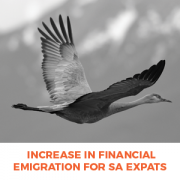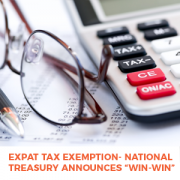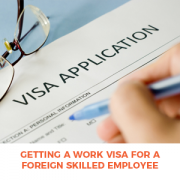Significant Increase In Financial Emigration For South African Expatriates
/in Archived, News /by XpatwebFinancial emigration is a formal process with the South African Reserve Bank (SARB) to change your tax status from “resident” to “non-resident” for exchange control purposes.
Claudia Aires Apicella, financial emigration specialist at Tax Consulting, says the financial emigration process does not require the giving up of one’s citizenship, passport, the selling of property or the cancellation of bonds and financial products.
This is a SARB legal requirement as well as a South African Revenue Service (SARS) requirement to confirm non-residency.
It is based on the question whether South Africa is still a person’s usual or principle residence, thus more aptly in comparing to other countries, one’s real home. The reason most people financially emigrate is because it gives legal certainty on their non-residency status for tax and exchange control purposes, as well as holding certain financial planning benefits such as the one of the few ways of cashing out your retirement annuity.
Tax Non-Compliance
South African tax residents who are living abroad are required to declare their worldwide income to SARS. However, many have left the country without submitting correct tax returns in South Africa, or going through the formal financial emigration process.
“These expatriates are at risk and the very clear message from National Treasury and SARS is that they must get their affairs in order.” Apicella explains that when a South African just works abroad, they are still classified as a South African tax resident living temporarily abroad and are subject to South African tax laws.
However, when they emigrate financially they cease to be a South African tax resident and will not be liable to pay any South African tax on their worldwide income. They will however be required to declare any South African sourced income which may be taxable, such as rental income. Also, there is a deemed disposal for capital gains tax purpose on certain property when you emigrate, but after that you are exempt from capital gains tax and estate duty in South Africa. This deemed disposal for capital gains tax is very often also misunderstood, as this only applies to certain assets and not to fixed property.
Increased Financial Emigration
The proposed change to the taxation of foreign income earned by South African tax residents has brought about a significant increase in financial emigration applications, says Aires.
South Africans will be required to pay tax on their offshore salaries and benefits should they earn more than R1 million per annum. “National Treasury confirmed in Parliament on the 14th September 2017 that the proposed change, forcing South African expatriates to start paying tax, will proceed and take effect in March 2020. Many high earning expatriates do not only emigrate now to have personal certainty on their tax status, but they also feel the R1m exemption is not enough taken their high cost of living.”
The Process
Apicella says the process has two key regulatory components namely the change of one’s Reserve Bank status to non-resident for exchange control purposes and obtaining a SARS tax clearance.
She says the more complex part of financial emigration is getting the Emigration Tax Clearance Certificate. This is part of the process where SARS notes you formally on record as non-resident.
When applying for the tax clearance certificate it may show that there are tax returns outstanding when there has been non-compliance in prior years. The outstanding returns will have to be brought up to date before SARS will issue the required certificate. Especially where you retrospectively financially emigrate, you must ensure there is alignment between your tax position and fiscal status.
NEWSFLASH: CABINET RESHUFFLE – NEW MINISTER OF HOME AFFAIRS, MS AYANDA DLODLO
/in Archived, News /by XpatwebExpatriate Tax Exemption – National Treasury Announces “WIN-WIN”
/in Archived, News /by XpatwebHowever, the outcome is vastly more beneficial than what was originally proposed by National Treasury and Barry Pretorius’ “Expatriate Petition Group” can certainly lay claim to having shaped the law hereon, including negotiating a generous R1m tax exemption per year for expatriates.
The Chairman of the Standing Committee of Finance, Yunus Carrim, as well as the National Treasury team led by Christopher Axelson, must very much be thanked for undertaking a genuine consultative process. The main tax law changes as announced by National Treasury are:
“The proposal will be changed to allow the first R1 million of foreign remuneration to be exempt from tax in South Africa if the individual is outside of the Republic for more than 183 days as well as for a continuous period of longer than 60 days during a 12 month period. The exemption threshold should reduce the impact of the amendment for lower to middle class South African tax residents who are earning remuneration abroad. The effect of the exemption will also be that South African tax residents in high income tax countries are unlikely to be required to pay any additional top up payments to SARS.”
“To allow greater time for individuals to either adjust their contracts or their circumstances and to finalise or formalise their tax status, it is proposed that the effective date for this proposal is extended to 1 March 2020.”
Based on a survey done by Expatriate Petition Group participants, which was shared by TaxConsulting to National Treasury, the group’s appointed tax technical advisors; this indicates that at least 60% of South Africans abroad will not be paying any taxes on their employment income. They will remain taxable in South Africa on interest, dividends, rental income, capital gains. On these other classes of income and not gains, not linked to employment, the tax law has always been clear that these must be disclosed to SARS and taxed in South Africa.
The vast non-compliance by many South African expatriates abroad has been noted by National Treasury and SARS. Many expatriates have left and not considered it necessary to submit tax returns in South Africa, submitted zero tax returns to SARS, some even indicated that they are unemployed for SARS, whilst actually earning employment income outside. These expatriates are at risk and the very clear message from National Treasury and SARS is that they must get their affairs in order.
Also, many South Africans have simply left without formalising their affairs with SARS or the South African Reserve Bank. National Treasury is cautioning them softly to do the correct thing:
“The formalisation of the tax residency status of South African tax residents who left the country many years ago is to be encouraged”.
The tax law change has also not closed certain perceived loopholes for tax planning, which National Treasury and SARS have indicated their existence. At this stage, it is unclear whether this may be changed in future, otherwise these will remain acceptable tax avoidance planning.
Jerry Botha, Managing Partner
Tax Consulting
14 September 2017
GETTING A WORK VISA FOR A FOREIGN SKILLED EMPLOYEE
/in Archived, News /by XpatwebIn truth, it’s extremely easy if you know what you need and how to go about it, but near impossible if you are inexperienced and make school boy errors.
Here are some expert tips to help:
Don’t lie
When an employee comes to render employment services in South Africa, make sure they get a valid short-term work visa. Do not take a chance and tell the immigration official this is only a business trip, when the purpose is work. It is easy to be compliant and not worth the risk. The process takes ten working days and the short-term visa is issued for three months, while it may be extended in South Africa for a further three months.
New foreign boss? Don’t stress
Getting a new boss from overseas is stressful enough, let alone making them think you are not competent in sorting out their work permit status and the family’s residency permits. Luckily, the intra-company transfer work visa is one of the quickest and cleanest visas to obtain. Just make sure you understand the rules and requirements upfront as one piece of incorrect guidance or supporting document, can put you back to square one. These take two months to obtain, end-to-end and where done effectively.
When you need that critical and rare skilled employee
What do you do when your business family just do not have an important skill that you need? There are some in the market, but they are rare and you just do not have the budget to attract and retain them?
The critical skill work visa route is a real game changer, mostly misunderstood and provides a brilliant and certain means to building a superior work force. You will be surprised to know the comprehensiveness of the qualifying skills. We have always been able to find a suitable category for a genuinely scarce skill in South Africa.
This category is also very attractive for the employer and expatriate. The employer gains a competitive edge on attraction and retention, as the visa is issued for the employer; whilst this category gives the expatriate the right to qualify in time for permanent residency in South Africa. One can rightly call this a win-win.
Do not make this crucial mistake
Stay away from the general work permit categories, except where you have a very large expatriate programme. This category has been made subject to an initial Department of Labour process, it has become virtually unobtainable. You will be promised an effective process, but after countless deadliness missed with impunity, you will still have no traction.
Waiving like a pro
The immigration laws of South Africa are very competently drafted legislation. This means that there are numerous special provisions which cater for situations which are unique and failsafe clauses, which gives discretion where you need help, but need something special for your organisation.
These include waiver provisions, which gives the department the right to waive certain legislative requirements.
Where you have a large project, or need to otherwise bring a large group of expatriates into South Africa, this is crucial for your expatriate programme.
Expatriate wellness
The work visa process should not be an isolated one. The same way that all aspects of your family needs looking after, the fiscal planning for an expatriate cannot be in isolation with the work visa process. This includes contracting correctly as expatriates have different terms and conditions of employment, expert tax planning including international tax planning, exchange control and banking planning; and even catering for their employee benefits, as normal South African benefit programmes are mostly too expensive for them and also seldom suitable.
As published by http://it-online.co.za/2017/08/02/getting-a-work-visa-for-a-foreign-skilled-employee/
FIND US
Johannesburg
17 Eaton Avenue,
Bryanston, Johannesburg,
Gauteng, 2191
South Africa
George
55 York Street
Dormehls Drift
George, 6529
South Africa
CONTACT US
Telephone:
South Africa: 011 467 0810
Postal:
PO BOX 35046
Northcliff
2115
IN THE NEWS
- Another Positive Move To Attract More Tourists To SA
- Bringing in the Bomb Squad at Home Affairs
- How Home Affairs’ Immigration Reforms Could Drive SA’s Growth in 2025
- Phindiwe Mbhele on Remote Work Visa: Splendid Cape Town is wooing more and more digital nomads
- Cape Town Shines, and So Does South Africa’s New Critical Skills Visa Overhaul





